india going global.indd - The IIPM Think Tank
india going global.indd - The IIPM Think Tank
india going global.indd - The IIPM Think Tank
You also want an ePaper? Increase the reach of your titles
YUMPU automatically turns print PDFs into web optimized ePapers that Google loves.
RESEARCH<br />
the due diligence if it is necessary,<br />
and should carry necessary mandate<br />
from the acquirer for such purpose.<br />
Unfortunately it is commonly seen<br />
that the due diligence team during<br />
due diligence process take due<br />
diligence to a routine, time bound,<br />
and target oriented exercise. On the<br />
other hand the directors of the acquirer<br />
always want to know whether<br />
the due diligence has been properly<br />
performed, whether the buyer understands<br />
the transaction, whether the<br />
target company is a strategic fit and whether there is a<br />
sound post deal implementation plan. <strong>The</strong>re is increased<br />
board scrutiny on the subject which reflects an awakening<br />
on the implications of risk arising out of due diligence<br />
relating to M&A. <strong>The</strong> Board of the acquirer wants to<br />
know the measures to be adopted to mitigate the risks<br />
arising out of the Merger and Acquisition proposal.<br />
Watson Wyatt’s Worldwide Mergers & Acquisitions Survey<br />
– Asia Pacific shows a difference in approach between<br />
the East and the West on M&A issues. However sector-wise<br />
combination is a continuing trend, mainly to achieve bigger<br />
volume of business and competitive<br />
size beside synergistic resemblance and<br />
cost reduction. However, lack of proper<br />
documentation from the end of the target<br />
company and reluctance on the part<br />
of the target in some cases pose difficulty<br />
in gathering information. This difficulty<br />
was further compounded by a lack of<br />
efficient data collection process in the<br />
acquiring organization and the lack of<br />
time in which to gather information.<br />
<strong>The</strong> survey also states that experienced<br />
acquirers dedicate longer time in making<br />
due diligence in a comprehensive and<br />
realistic manner covering the pertinent<br />
issues involved. A rigorous approach to<br />
commercial due diligence helps acquirers to negotiate better,<br />
reduce risk and perhaps avoid disaster.<br />
80 Need the Dough July-October - 2007<br />
Information gathered through due diligence Scale 0-40<br />
Hard assets 35<br />
Market share, distribution 31<br />
Financial aspects and HR function 30<br />
Management capabilities and willingness to co-operate 26<br />
Technological and business competencies 26<br />
Major shareholders 25<br />
HR Policy matters 20<br />
Workforce potential 19<br />
Organizational culture and dynamics of change 18<br />
Watson Wyatt’s M & A survey discloses the following:<br />
From the above it is apparent that due diligence study makers<br />
give more importance to hard assets and market share<br />
but focus less on workforce potential and organizational<br />
culture. Due diligence makers assume some time that the<br />
knowledge pool or the competency level of the acquirer<br />
is greater and better than the target company. <strong>The</strong>refore,<br />
the intellectual capital and managerial capability are the<br />
two important casualties in normal due diligence process.<br />
Learning ability, sharing ability, adoptability of new<br />
knowledge and courage for further invention are the key<br />
areas through which the level of intellectual capabilities<br />
of any organization could be assessed. <strong>The</strong> due diligence<br />
team through a knowledge audit may try to ascertain the<br />
level of intellectual capital of the target company or may<br />
even reconcile the findings of the knowledge audit with the<br />
acquirer to ascertain its real intellectual strength. <strong>The</strong>se are<br />
issues examined by the due diligence and post deal integration<br />
teams. <strong>The</strong> nature of queries and their response on<br />
the degree of importance is quite signifacant and may be a<br />
Nature of queries Critical Important Unimportant<br />
Retention of key talent 76 21 3<br />
Employee communication 76 18 6<br />
Retention of key managers 74 26 0<br />
Integration of corporate culture 49 49 2<br />
Managing resistance 30 57 13<br />
Labour relation 28 54 18<br />
Alignment of compensation 27 61 12<br />
Retraining workforce 26 58 16<br />
Recruitment of new staff 18 61 21<br />
Redeployment of workers 10 59 31<br />
Downsizing 10 68 22<br />
tool of learning for the management in the process of due<br />
diligence and integration period.<br />
<strong>The</strong> cultural assessment in the pre M&A period and the<br />
alignment of cultures between the target company and the<br />
acquirer is an important element in the post M&A integration<br />
stage. <strong>The</strong>re are instances where poor post-deal integrations<br />
have dampened the acquisition. Experts agree that<br />
mergers generally create value beyond the combined value<br />
of both the targets and the acquirers. Experts also say that<br />
success of M&A depends on adequate pre-deal due diligence<br />
and post deal integration, with the help of findings of due<br />
diligence report of M&A.



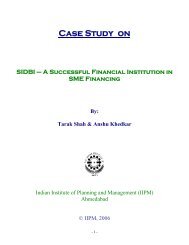
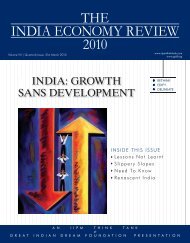
![[Feb 2008, Volume V Annual Issue] Pdf File size - The IIPM Think Tank](https://img.yumpu.com/43961117/1/190x245/feb-2008-volume-v-annual-issue-pdf-file-size-the-iipm-think-tank.jpg?quality=85)
![[June 2008, Volume V Quarterly Issue] Pdf File size - The IIPM Think ...](https://img.yumpu.com/41693247/1/190x245/june-2008-volume-v-quarterly-issue-pdf-file-size-the-iipm-think-.jpg?quality=85)
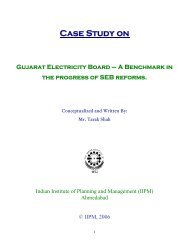
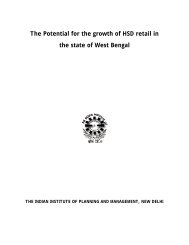
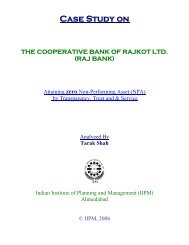
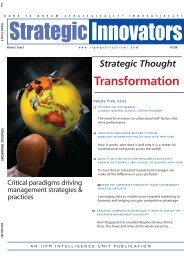
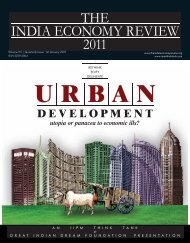
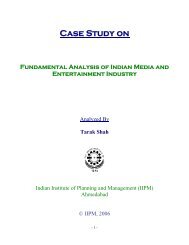
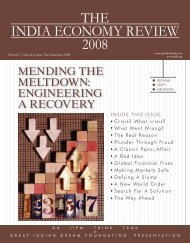
![[Dec 2007, Volume 4 Quarterly Issue] Pdf File size - The IIPM Think ...](https://img.yumpu.com/29766298/1/190x245/dec-2007-volume-4-quarterly-issue-pdf-file-size-the-iipm-think-.jpg?quality=85)
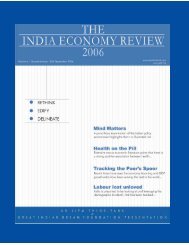
![[Volume VI | Quarterly Issue: 31st May 2009] Pdf File size](https://img.yumpu.com/27796051/1/190x245/volume-vi-quarterly-issue-31st-may-2009-pdf-file-size.jpg?quality=85)